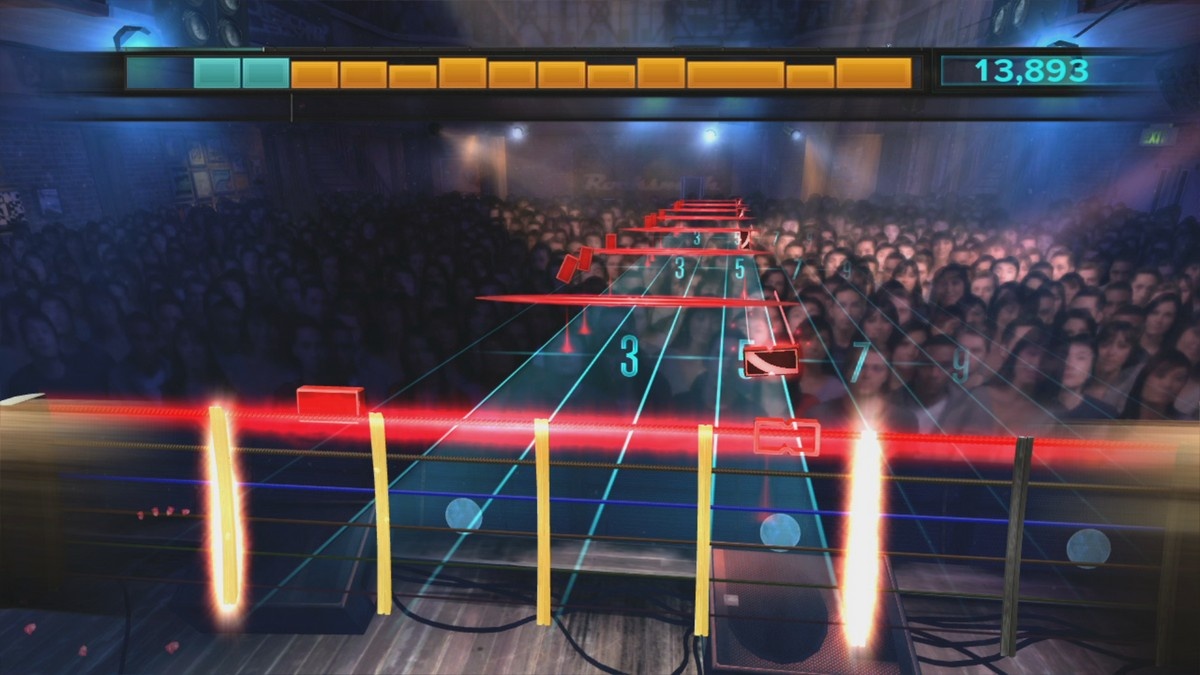Forging musical awesomeness one note at a time.
Finally! A music-based game where I don't have to cradle a hunk of plastic in my arms and press colorful buttons in order to accomplish through a console what countless drunkards can accomplish with a karaoke machine. Musical mimicry without the need for any actual talent.
Sure, you might be able to make it to expert mode in games like Rock Band and Guitar Hero, but when you set down that "controller", what have you really learned? Who has the best color recognition? I've been playing the acoustic guitar for about five years now and I wouldn't classify myself as a trailblazing minstrel, but I've mastered the guitar basics. Deep down, I have always been dreaming of more. You can only do so many Sister Hazel covers in your lifetime…
The electric guitar can be intimidating, but Rocksmith's approach simplifies the learning process and makes it more accessible to a wider range of players. The only catch is that having a basic knowledge of the guitar or some form of musical education is almost essential to beginning this game. Aside from technique videos that introduce you to strumming, holding a guitar, and playing notes, there is little else done to educate the player about music in general. So if you don't have a musical bone in your body, Rocksmith will be intimidating to strap on.
In Journey mode, essentially the career mode, you can choose to learn the songs in the order that Rocksmith thinks is best or you can go through the track list and learn them on your own. For more advanced players, jumping straight into whatever song you want shouldn't be a problem, but if you've never played an electric guitar before, it's best to begin with Journey Mode. When you begin, you'll start off with songs that have a more simplistic single-note melody base and build upon that. Once you achieve your target accuracy you'll be cleared to perform the songs and attempt to level up.
As you progress, you'll begin unlocking vids for different techniques, associated with the songs you are learning. These include sustains, string bending, palm mutes, and more. Every new technique is accompanied by an instructional video and a practice exercise, so you can work on each one individually. It's much easier than wading through poorly produced YouTube how-to videos.

Another mode that allows you to break a song down is the Riff Repeater Mode. This mode has two different categories, each geared towards helping you master the key melodies of any particular song. The first category is "leveler", where you are given five attempts to play a riff correctly in order to increase its difficulty in the song itself. That's the game's variable difficulty at play. If you're not trying to make the song more difficult, then the "free speed" option would be best, in which the song will pause if you miss a note/chord, allowing you time to correct your mistake. Practicing with these two modes before beginning a new song is extremely beneficial and recommended before jumping straight into rehearsal mode.
Rocksmith has a list of enjoyable educational mini-games as well that build specific guitar techniques. You can practice single-notes in Ducks, chords in Dawn of the Chordead, or play Big Swing Baseball and practice your string-bending skills. While these games are fun, there are many hang-ups that get in the way, though much of it has nothing to do with mini-games themselves.
The sensitivity of Rocksmith forces you to always play a note perfectly. If you're playing a single note and your finger isn't precisely where it should be, the note will not register in the game. Sometimes the game wants you to hold down a string on the fret and sometimes somewhere in between. Perhaps it has to do with the fact that I did not use the Epiphone guitar from the $200 bundle, but my own guitar along with the proprietary Rocksmith cable that turns any electric guitar (and even acoustic guitar, if you've got a plug and play kit) into a compatible peripheral. Any experienced guitarist knows that you can't be 100% on point all the time. Rocksmith demands perfection constantly and will settle for nothing less.

This call for consistent accuracy might be enough to deter beginning guitarists. It's hard enough getting used to the pain of building calluses so you can play for more than a few hours without your fingers bleeding. The Dynamic Difficulty setting is a cruel mistress. When you finally get a phrase down, the game will increase the difficulty in the middle of the song, throwing up new versions of riffs even if you haven't practiced them before. Fail to play the right note and you'll see incoming notes drop off the screen.
It's kind of like a virtual slap to the face. Some might see it and be motivated; most others will see it and just feel too defeated to try again. There's really no way to get around this. The difficulty setting in the game can only revert you back to beginner status at square-zero—there's no in between. Although the technique exercises and riff repeater modes are sufficient in helping to overcome difficult songs, the addition of a manual "slow down" function, like the one in the Break it Down mode in Dance Central, would have been enough to make rehearsing less daunting.
There is incredible value to buying this game even if you aren't interested in the educational perks. There is an entire Amp mode where you can customize up to three different foot pedals and create unique guitar tones and play freely or use them in any of the songs in game. I've never fooled around with tones or distortion before so having the ability to access a wide variety of amp features is a huge bonus. Basic guitar and amp combo deals usually only include an amp with one distortion. The only downside is that the controller is the foot pedal, so if you want switch tones mid-jam, you'll have to stop playing and press a button. The other great value of the game is that it helps tune your guitar every time you play and if you access the tuner through the main menu, you have the option of tuning to E standard or Drop D.
Many people might be turned off to Rocksmith due to its lack of party game appeal, but that's not what it's about. It's about making a difficult instrument easy and fun to learn, and it accomplishes that. For beginners Rocksmith may seem like a hellish gauntlet, but for more experienced players it will be slightly less harsh and possibly even too easy at times. Rocksmith has already begun to improve my skill level and make me more confident when executing different guitar techniques, so I'm all the evidence you need. The things I've been able to learn so far will definetly carry over to any songs I want to lean outside of the game. If you're really serious about wanting to learn how to play guitar, Rocksmith is more than worth it.
Review based on PS3 version. Copy provided by publisher.
-
Song breakdown modes are helpful
-
Amp Mode and Tone Customization add value
-
In-game tuner is a godsend
-
Guitarcade is fun but difficult at times
-
Learning curve may be too much for beginners
-
No manual difficulty control
-
Chord tab diagrams a little hard to understand
-
Learn how to play the guitar!







